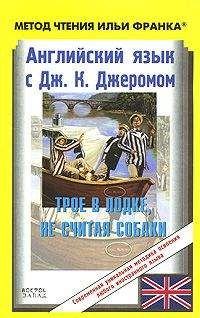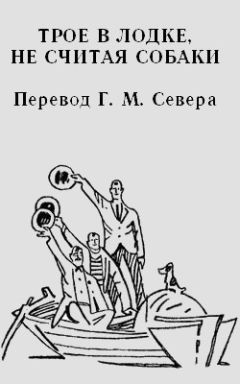Jerome Jerome - Английский язык с Джеромом К. Джеромом. Трое в лодке, не считая собаки
headache [ˈhedeɪk] respectable [rɪsˈpektǝb(ǝ)l] disgraceful [dɪsˈɡreɪsful]
"Oh, ah — yes," he answered, brightening up; "I remember now. I did have a headache that afternoon. It was the pickles, you know. They were the most disgraceful pickles I ever tasted in a respectable boat. Did you have any?"
For myself, I have discovered an excellent preventive against sea-sickness, in balancing myself. You stand in the centre of the deck, and, as the ship heaves and pitches, you move your body about, so as to keep it always straight. When the front of the ship rises, you lean forward, till the deck almost touches your nose; and when its back end gets up, you lean backwards. This is all very well for an hour or two; but you can't balance yourself for a week.
George said:
"Let's go up the river (давайте поднимемся по реке/отправимся вверх по реке)."
He said we should have fresh air, exercise and quiet (он сказал, у нас будет свежий воздух, моцион: «упражнение = физическая нагрузка» и тишина/покой); the constant change of scene would occupy our minds (постоянная смена пейзажа займет наши мысли; scene — место действия, окружение; пейзаж, картина; mind — разум, ум, память; мысль, намерение) (including what there was of Harris's (включая и /то/, что было в /голове/ Гарриса)); and the hard work would give us a good appetite, and make us sleep well (а тяжелая /физическая/ работа даст нам = вызовет хороший аппетит и заставит нас = поможет нам хорошо спать).
Harris said he didn't think George ought to do anything (Гаррис сказал, он не думает, /что/ Джорджу следует делать что-либо) that would have a tendency to make him sleepier than he always was (что будет иметь тенденцию к тому, чтобы сделать его более сонным, чем он есть всегда), as it might be dangerous (так как это может быть опасным).
occupy [ˈɔkjupaɪ] appetite [ˈæpɪtaɪt] tendency [ˈtendǝnsɪ]
George said:
"Let's go up the river."
He said we should have fresh air, exercise and quiet; the constant change of scene would occupy our minds (including what there was of Harris's); and the hard work would give us a good appetite, and make us sleep well.
Harris said he didn't think George ought to do anything that would have a tendency to make him sleepier than he always was, as it might be dangerous.
He said he didn't very well understand (он сказал, /что/ не очень хорошо понимает) how George was going to sleep any more than he did now (как Джордж собирается спать больше, чем он спит теперь), seeing that there were only twenty-four hours in each day (если принять во внимание, что в каждых сутках только двадцать четыре часа; to see — видеть, смотреть; понимать, сознавать; seeing — ввиду того, что; принимая во внимание), summer and winter alike (летом и зимой одинаково); but thought that if he did sleep any more (но считает, что если бы тот действительно спал больше), he might just as well be dead (он мог бы с тем же успехом быть мертвым), and so save his board and lodging (и таким образом сэкономить /деньги/ за квартиру и стол; board and lodging — квартира и стол, полный пансион; board — доска; обеденный, накрытый стол; питание; lodging — жилище, жилье).
Harris said, however, that the river would suit him to a "T" (Гаррис сказал, однако, что река подойдет ему полностью; to a T — в совершенстве, точь-в-точь, как раз; T-square — рейсшина /линейка с перекладиной на одном конце для проведения параллельных линий/). I don't know what a "T" is (не знаю, что такое «ти») (except a sixpenny one, which includes bread-and-butter and cake ad lib. (кроме шестипенсового чая, который включает хлеб с маслом и торт по желанию; t [ti:]; tea [ti:] — чай; ad lib. = ad libitum — как угодно, по желанию, на выбор), and is cheap at the price, if you haven't had any dinner (дешевый по цене, если вы не обедали)). It seems to suit everybody, however, which is greatly to its credit (кажется, он подходит всем, тем не менее, что значительно для его чести = делает ему честь; credit — доверие; хорошая репутация, доброе имя).
It suited me to a "T" too (река тоже устраивала меня «полностью»), and Harris and I both said it was a good idea of George's (Гаррис и я оба сказали, /что/ это хорошая мысль Джорджа); and we said it in a tone that seemed to somehow imply (мы сказали это с таким выражением, которое так или иначе показывало; tone — тон, интонация; выражение; to imply — предполагать, подразумевать; выражать неявно, иметь в виду, намекать) that we were surprised that George should have come out so sensible (будто мы удивлены, что Джордж оказался таким благоразумным; to come out — выходить, появляться; обнаружиться /об информации и т.д./; проявить себя в чем-либо; sensible — благоразумный, здравомыслящий; sense — чувство, ощущение; здравый смысл, рассудок).
except [ɪkˈsept] suited [ˈsju:tɪd] idea [aɪˈdɪǝ] sensible [ˈsensǝb(ǝ)l]
He said he didn't very well understand how George was going to sleep any more than he did now, seeing that there were only twenty-four hours in each day, summer and winter alike; but thought that if he did sleep any more, he might just as well be dead, and so save his board and lodging.
Harris said, however, that the river would suit him to a "T". I don't know what a "T" is (except a sixpenny one, which includes bread-and-butter and cake ad lib., and is cheap at the price, if you haven't had any dinner). It seems to suit everybody, however, which is greatly to its credit.
It suited me to a "T" too, and Harris and I both said it was a good idea of George's; and we said it in a tone that seemed to somehow imply that we were surprised that George should have come out so sensible.
The only one who was not struck with the suggestion was Montmorency (единственным, кто не был в восторге от этого предложения: «не был поражен этим предложением», был Монморенси; to strike — ударять/ся/, бить; поражать, производить впечатление). He never did care for the river, did Montmorency (он никогда не питал любви к реке, /этот/ Монморенси; to care for — нравиться, любить; питать интерес к; заботиться о).
"It's all very well for you fellows (это все прекрасно для вас, приятели)," he says; "you like it, but I don't (вам это нравится, а мне нет). There's nothing for me to do (там мне делать нечего). Scenery is not in my line, and I don't smoke (пейзаж/ландшафт — это не для меня, и я не курю; in line — находящийся на одной линии; in somebody`s line — соответствующий чьим-либо интересам, склонностям). If I see a rat, you won't stop (если я увижу крысу, вы не остановитесь; won't = will not); and if I go to sleep, you get fooling about with the boat, and slop me overboard (а если засну, вы начнете дурачиться на лодке и опрокинете меня за борт; to fool about — играть, забавляться; дурачиться; fool — дурак, глупец; to slop — проливать/ся/, расплескивать/ся/). If you ask me, I call the whole thing bally foolishness (если спросите меня, я назову все это дело полной глупостью; bally — страшный, ужасный, чертовский)."
We were three to one, however, and the motion was carried (нас было трое к одному = против одного, однако, и предложение было принято).
suggestion [sǝˈʤesʧ(ǝ)n] bally [ˈbælɪ] foolishness [ˈfu:lɪʃnɪs]
The only one who was not struck with the suggestion was Montmorency. He never did care for the river, did Montmorency.
"It's all very well for you fellows," he says; "you like it, but I don't. There's nothing for me to do. Scenery is not in my line, and I don't smoke. If I see a rat, you won't stop; and if I go to sleep, you get fooling about with the boat, and slop me overboard. If you ask me, I call the whole thing bally foolishness."
We were three to one, however, and the motion was carried.
CHAPTER II
(глава вторая)
Plans discussed (планы обсуждены). — Pleasures of "camping-out," on fine nights (прелести ночевки под открытым небом в хорошие/ясные ночи; pleasure — удовольствие, наслаждение, радость; to camp out — ночевать в палатках или на открытом воздухе). — Ditto, wet nights (то же — во влажные, сырые ночи; ditto — то же, такой же /для избежания повторения сказанных ранее слов/). — Compromise decided on (пошли на компромисс; to decide on — выбирать, решаться на что). — Montmorency, first impressions of (Монморенси, его первые впечатления). — Fears lest he is too good for this world (опасения, что он слишком хорош для этого мира; fear — боязнь, опасение, страх; lest — чтобы не, как бы не), fears subsequently dismissed as groundless (опасения впоследствии отброшены как безосновательные; to dismiss — распускать, увольнять; отвергать, выбрасывать из головы; groundless — безосновательный, беспричинный; ground — земля, почва; причина, основание). — Meeting adjourns (заседание откладывается; meeting — заседание, митинг, собрание; to adjourn — откладывать, отсрочивать, оттягивать).
Plans discussed. — Pleasures of "camping-out," on fine nights. — Ditto, wet nights. — Compromise decided on. — Montmorency, first impressions of. — Fears lest he is too good for this world, fears subsequently dismissed as groundless. — Meeting adjourns.
WE pulled out the maps, and discussed plans (мы вытащили карты и обсудили планы).
We arranged to start on the following Saturday from Kingston (мы договорились отправиться /в путешествие/ в следующую субботу от Кингстона). Harris and I would go down in the morning (Гаррис и я спустимся /туда/ утром), and take the boat up to Chertsey (и приведем лодку вверх до Чертси), and George, who would not be able to get away from the City till the afternoon (а Джордж, который не сможет выбраться из Сити до полудня; the City — Сити, деловой центр Лондона) (George goes to sleep at a bank from ten to four each day, except Saturdays, when they wake him up and put him outside at two) (Джордж засыпает = спит в банке с десяти до четырех каждый день, кроме суббот, когда его будят и выставляют /за дверь/ в два; to put out — выгонять; устранять; выставлять; outside — снаружи, извне; вовне, наружу), would meet us there (встретит нас там).
compromise [ˈkɔmprǝmaɪz] subsequently [ˈsʌbsɪkwǝntlɪ] adjourn [ǝˈʤǝ:n]
WE pulled out the maps, and discussed plans.
We arranged to start on the following Saturday from Kingston. Harris and I would go down in the morning, and take the boat up to Chertsey, and George, who would not be able to get away from the City till the afternoon (George goes to sleep at a bank from ten to four each day, except Saturdays, when they wake him up and put him outside at two), would meet us there.
Should we "camp out" or sleep at inns (следует ли нам ночевать на открытом воздухе или в гостиницах; inn — гостиница, постоялый двор, трактир)?
George and I were for camping out (Джордж и я были за ночевку на воздухе). We said it would be so wild and free, so patriarchal like (мы сказали, это будет так дико и свободно, так патриархально; like — аналогичный, подобный).



